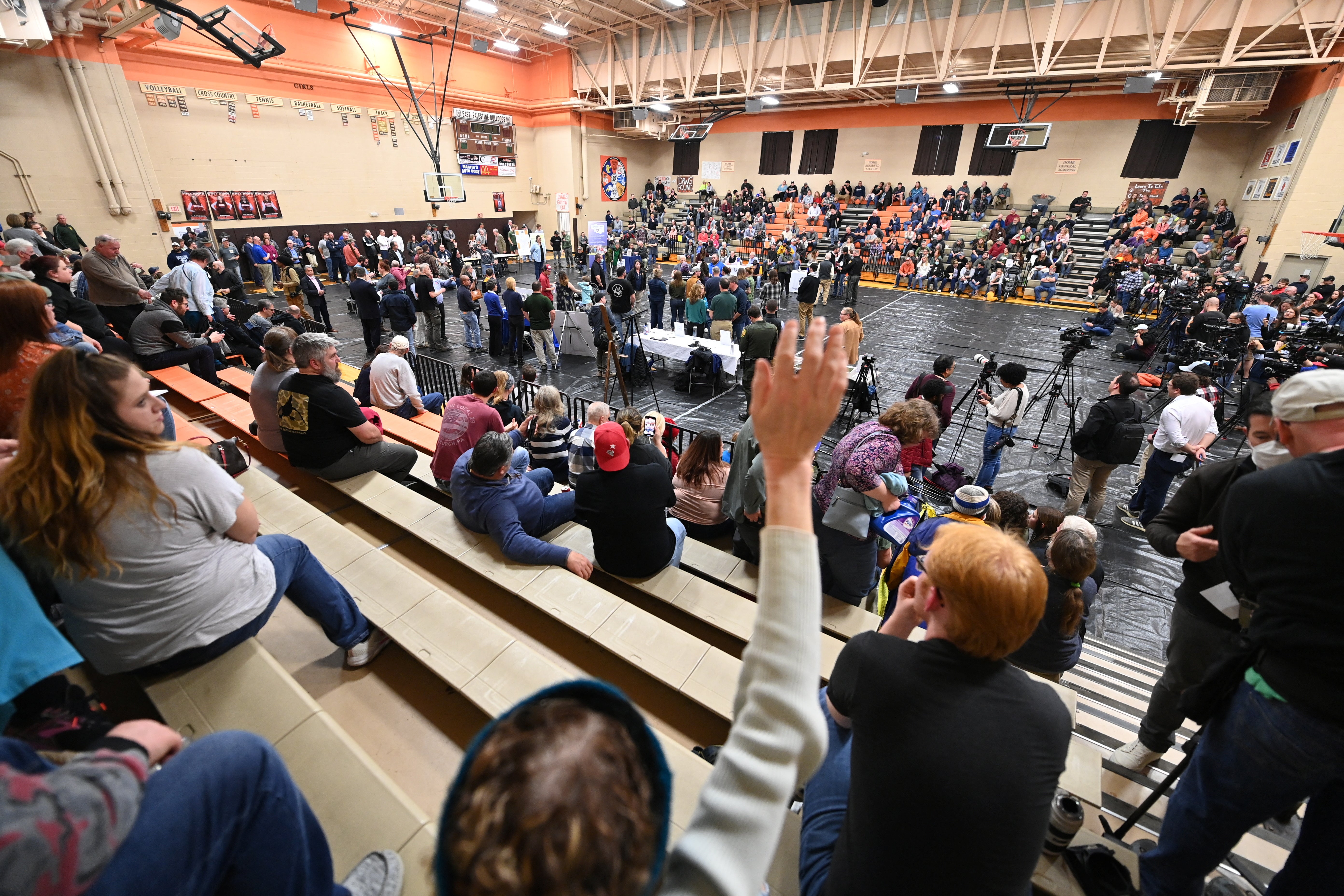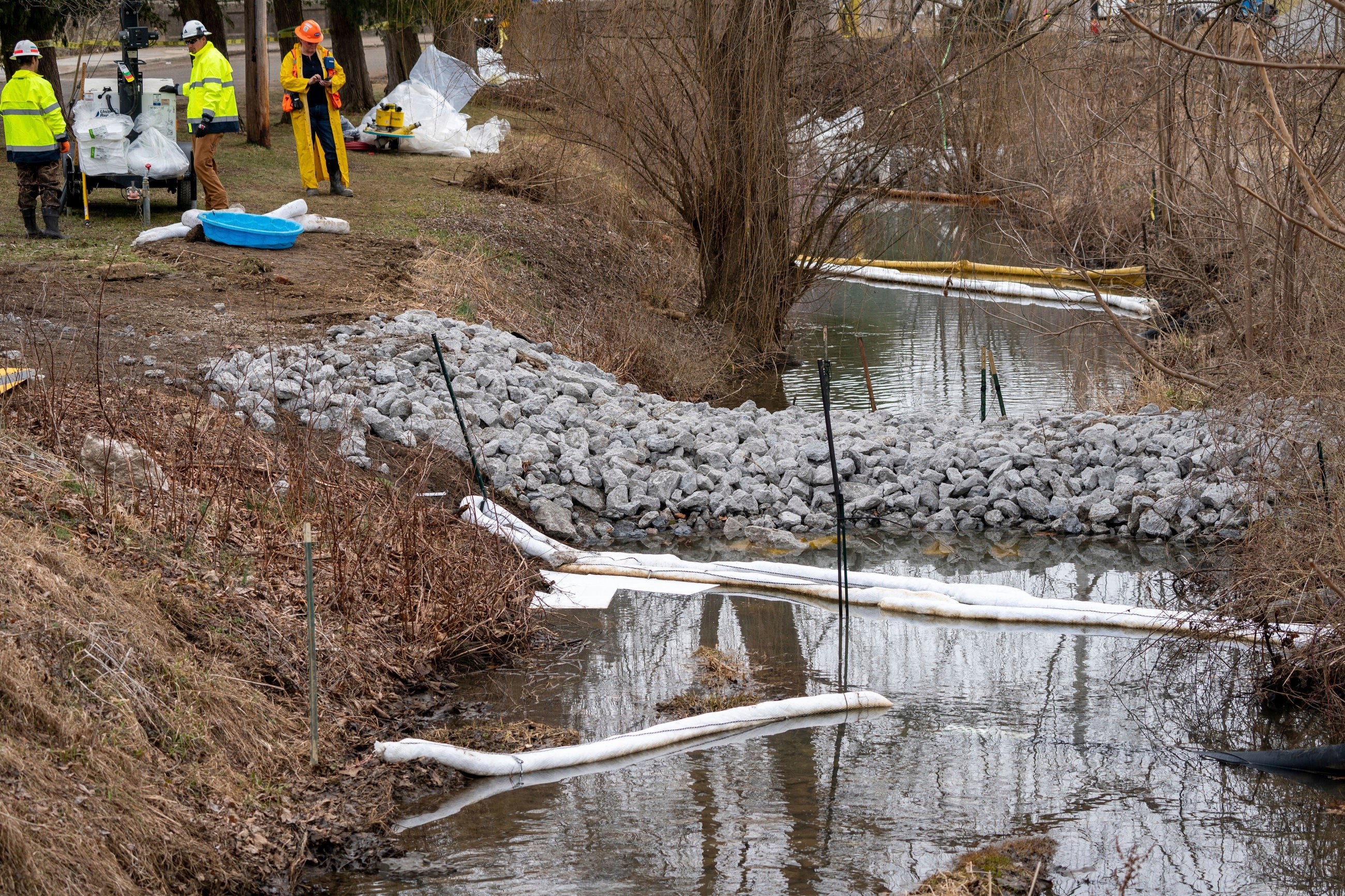I went home to report on the Ohio train derailment, and what I found was a deep - and justifiable - distrust
The people with the power to help East Palestine are being met with scepticism from residents — and it’s hard to blame them

Your support helps us to tell the story
From reproductive rights to climate change to Big Tech, The Independent is on the ground when the story is developing. Whether it's investigating the financials of Elon Musk's pro-Trump PAC or producing our latest documentary, 'The A Word', which shines a light on the American women fighting for reproductive rights, we know how important it is to parse out the facts from the messaging.
At such a critical moment in US history, we need reporters on the ground. Your donation allows us to keep sending journalists to speak to both sides of the story.
The Independent is trusted by Americans across the entire political spectrum. And unlike many other quality news outlets, we choose not to lock Americans out of our reporting and analysis with paywalls. We believe quality journalism should be available to everyone, paid for by those who can afford it.
Your support makes all the difference.Like the rest of the country, I was shocked and morbidly fascinated by the towering pillar of black that rose above East Palestine in early February after a Norfolk Southern train derailed and officials chose to burn off the hazardous and highly flammable vinyl chloride gas it was carrying.
Unlike the rest of the country, I was already very familiar with the tiny Ohio village — I spent many hours there in my early and late teens visiting with my father and stepmother.
My father was a sales executive working in Cleveland, frequenting jazz shows and dining out in the big city when he began dating my stepmother, who was born and raised in East Palestine. He eventually moved out there, and within the first week found himself hobbling around on crutches trying to catch a runaway hog and cow, and later dodging a snake he found in the basement of my stepmother’s house. My stepmother called it his "initiation."
It was a bit of a culture shock.
He eventually settled into his new life, and I stayed in Youngstown, a small Rust Belt city about 20 miles away from East Palestine. I worked as a city news reporter at the local daily. In addition to covering crime and politics, my chosen beat was the efforts to revitalise the city, which had largely been abandoned after the steel industry moved away and left Youngstown an economically-depressed, hollowed-out shell of its former self.
While I never took to the more pastoral existence of even-smaller town Ohio, I couldn’t help but feel a kindred anger with the people of East Palestine I spoke with during a recent reporting trip back to my home-away-from-home.
Another Rust Belt town, full of hard-working people, that’s entire existence is threatened due to a corporation’s pursuit of higher profits. Just like Youngstown.
There’s ample reporting now on the whys of the train derailment in East Palestine; Norfolk Southern lobbying against a specific type of brake that could have helped mitigate the crash; Donald Trump’s administration rolling back the regulation that would have forced the company to install those brakes; Joe Biden breaking a rail workers strike that was, among other request, asking for safer working conditions.
Apart from the cloud of hazardous chemicals presumably floating above the village and the worry that the groundwater will be polluted by the vented vinyl chloride, there’s another factor amplifying the dread in East Palestine — a complete lack of trust in any of the institutions tasked with cleaning up the mess.
Nearly everyone I spoke with distrusted the messaging coming from Governor Mike DeWine, or the assurances given by the EPA.
They were told the village water was safe to drink, but advised if they had well water to drink bottled until further test data was available. They weren’t buying it.

They were told the itching eyes and headaches and rashes some residents were reporting were common side effects of exposure to volatile organic compounds, but that they would pass and would likely pose no long-term threats. They weren’t buying that, either.
East Palestine is red-dead Trump country. Numerous conversations I had began with residents expressing very reasonable concerns about their health and the longterm impacts the disaster might have on their community, but then would inevitably veer off into right-wing conspiracy.
One man suggested, mid-way through a conversation about groundwater pollution, that NFL player Damar Hamlin’s injury was brought on by the Covid-19 vaccination. Another man explained his struggle to find lodging for his large family during the evacuation before wondering aloud if the Netflix film "White Noise" — which focuses on a trail derailing and spilling dangerous chemicals — was made to signal the real world disaster, noting that the director, Noah Baumbach, is Jewish, and reminding me that the village’s name was East Palestine, after all.
In any other context it might be easy for someone with left-leaning politics to roll their eyes at the absurd conspiracy theories — and with regard to Mr Hamlin and Mr Baumbach it was — but were they wrong to question the EPA? Or wrong to suspect the state wasn’t telling them everything?
I slept in Youngstown during my nights back home. I figured some distance from the village would likely decrease the chances that I develop any symptoms the residents were describing, plus I figured I could spend some time with college friends during my few off-hours.
My friends are college educated and work for the public good. A nurse, several teachers, a pair of highly successful clinical counselors. All vote Democrat. All despise Trump. None of them were buying what the state was selling.
And the truth is, I don’t blame them.
I’m a reporter — trained to cut through the crap and the nonsense and look for the data and the unseen connections between people and issues — and even I can’t land on solid ground when it comes to the situation in East Palestine.
On my second day in the village I noticed a truck pumping a four foot geyser of water out of a nearby creek. I stopped to ask what was going on. The driver of the truck grimaced and said "I can’t say. You’d have to ask Norfolk Southern." He gave me a phone number to call, so I called.

I explained where I was, what I saw, and asked what was going on. The man on the other end of the number told me "I have no idea." I asked again, adding even more detail.
"I have no idea." He asked no clarifying questions, offered no assurance that he would check and get back to me. He simply said he did not know, and that was that.
Maybe I’m too close to the situation, but I think — regardless of where you land on the political spectrum — the one-two punch of the erroneously contested 2020 presidential election followed by the government’s response to the Covid-19 pandemic has utterly shattered the public’s ability to trust anyone in power. That is to say nothing of Flint, Michigan, or Camp Lejeune, or Texas’ ERCOT, or the Uvalde police.
I saw this viscerally illustrated on the night of East Palestine’s open house turned town hall meeting when Ohio Department of Health chief medical officer Dr Bruce Vanderhoff, decked out in a white lab coat and bowtie like any good scientist, explained at length why people were experiencing symptoms. The audience rejected his explanation outright.
"I don’t know what to do to provide further assurances," he replied, utterly deflated.
There have been at least two more train derailments since the disaster in East Palestine. It is inevitable that there will be more disasters to come, especially as the climate crisis worsens.
Americans need to trust the institutions put in place to protect them and assist them in times of crisis. But those institutions have a long road to walk to earn back that trust, if it’s even possible at this point.
Until then, the people in East Palestine — and Americans weathering crises around the country — will be left angry, scared, and utterly uncertain about their futures.




Join our commenting forum
Join thought-provoking conversations, follow other Independent readers and see their replies
Comments